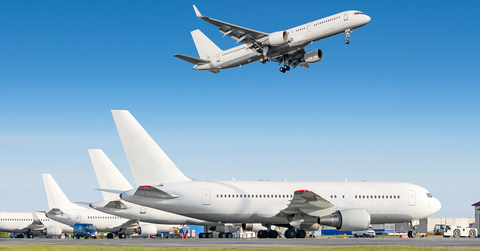Airline Stocks in Focus as US Airstrike Lifts Oil Prices
The US airline stocks are in focus as crude oil prices soar after the US assassinated a top Iranian military commander last Thursday night.
Nov. 20 2020, Updated 11:49 a.m. ET

The US airline stocks are in focus as crude oil prices soar after the US assassinated a top Iranian military commander. The US government announced last Thursday night that it killed Iran’s Quds force commander, Major General Qassem Soleimani.
According to a CNN report, the assassination was done through an airstrike at the Baghdad International Airport. President Donald Trump approved the airstrike following a strong intelligence report that states Soleimani was planning to attack American diplomats and service members in Iraq.
Oil prices soar on rising US-Iran tensions
Following the news, oil prices rose as investors fear heightening geopolitical tensions in the Middle East region. Since last Friday, West Texas Intermediate (WTI) and Brent crude prices gained over 5% and 6%, respectively.
We believe that oil prices could surge further as Iran has warned that it would take revenge for Soleimani’s death. Meanwhile, Iraq passed a resolution in its parliament to end all foreign troops on its land. In response to Iraq’s declaration, Trump administration warned on Sunday to impose sanctions on Iraq, according to a Reuters report.
Sanctions on Iraq and geopolitical tensions in the Middle East could disrupt global oil supply. Notably, Iraq is the second-largest oil producer among the Organization of the Petroleum Exporting Countries (OPEC).
Airline stocks fell last Friday
The broader US market fell drastically last Friday. The Dow Jones, S&P 500, and Nasdaq Composite indexes fell 0.8%, 0.7%, and 0.8%, respectively. Airline stocks were among the biggest losers in the stock market last Friday. The top four US carriers, Delta Air (DAL), Southwest Airlines (LUV), United Airlines (UAL), and American Airlines (AAL) stocks plunged 1.7%, 0.9%, 2.1%, and 5%, respectively.
Although geopolitical concerns don’t impact the industry directly, they will affect it in the long run. Also, it could hurt passenger traffic. People will likely cancel or postpone their vacation plans for the Middle East region, thereby impacting airlines’ passenger traffic.
Airlines could see a jump in fuel costs
Oil prices have a direct impact on airlines and airline stock. Notably, fuel costs account for about one-fourth of airlines’ operating expenses. The US carriers have been enjoying the benefit of low crude prices throughout last year compared to 2018.
In 2018, the average WTI and Brent prices were $64.94 and $71.06, respectively. However, in 2019, the average WTI was $56.72. Also, Brent was at $64.09.
Over 10% YoY (year-over-year) decline in crude prices helped airlines partially offset the negative impact from Boeing’s (BA) troubled 737 MAX jets. In the first three quarters of 2019, American Airlines registered a 6.4% YoY decline in average fuel cost per gallon. During the same period, Southwest and United’s average fuel cost per gallon fell 5.9% and 6.7%, respectively.
Boeing’s 737 MAX crash spells trouble for airlines
Together, the three companies faced over 50,000 flight cancelations during the period due to the worldwide flying ban on the 737 MAX jets. Boeing’s 737 MAX aircraft is facing a global flying ban since mid-March following two deadly accidents within five months.
However, the three companies have recorded an improvement in their respective pre-tax margins and hopefully their airline stocks. This is mainly due to lower fuel costs. Southwest reported a 40 basis points YoY improvement in third-quarter pre-tax margin. American and United pre-tax margin grew by 80 basis points and 250 basis points, respectively.
Therefore, the heightened geopolitical tension in the Middle East could have a massive impact on airlines’ profitability in upcoming quarters. The extent of the losses will depend on how fast the US, Iran, and Iraq restrain themselves from further escalating the issues.
Airline stocks’ 2019 performance
Airline stocks failed to match the last year’s broader market rally. Uncertainty over US-China trade negotiations and global economic slowdown concerns kept investors highly concerned about airlines’ growth prospects. In mid-September, airline stocks hit hard following a drone strike on a Saudi Arabian oil refinery.
Additionally, airlines faced multiple business disruptions due to the partial government shutdown, unfavorable weather, and Hong Kong protests. Also, the worldwide grounding of Boeing’s 737 MAX jets raised concerns about various airlines’ growth prospects.
The US Global Jets ETF (JETS) underperformed the broader market last year. JETS invests in passenger airlines, airports, and terminal services providing companies. The ETF surged 13% in 2019, while the Dow Jones, S&P 500, and Nasdaq gained 22%, 29%, 35%, respectively.
Among the top four major US carriers, American Airlines was the worst performer. AAL fell 11% last year. UAL, LUV, and DAL soared 5%, 16%, and 17%, respectively.
